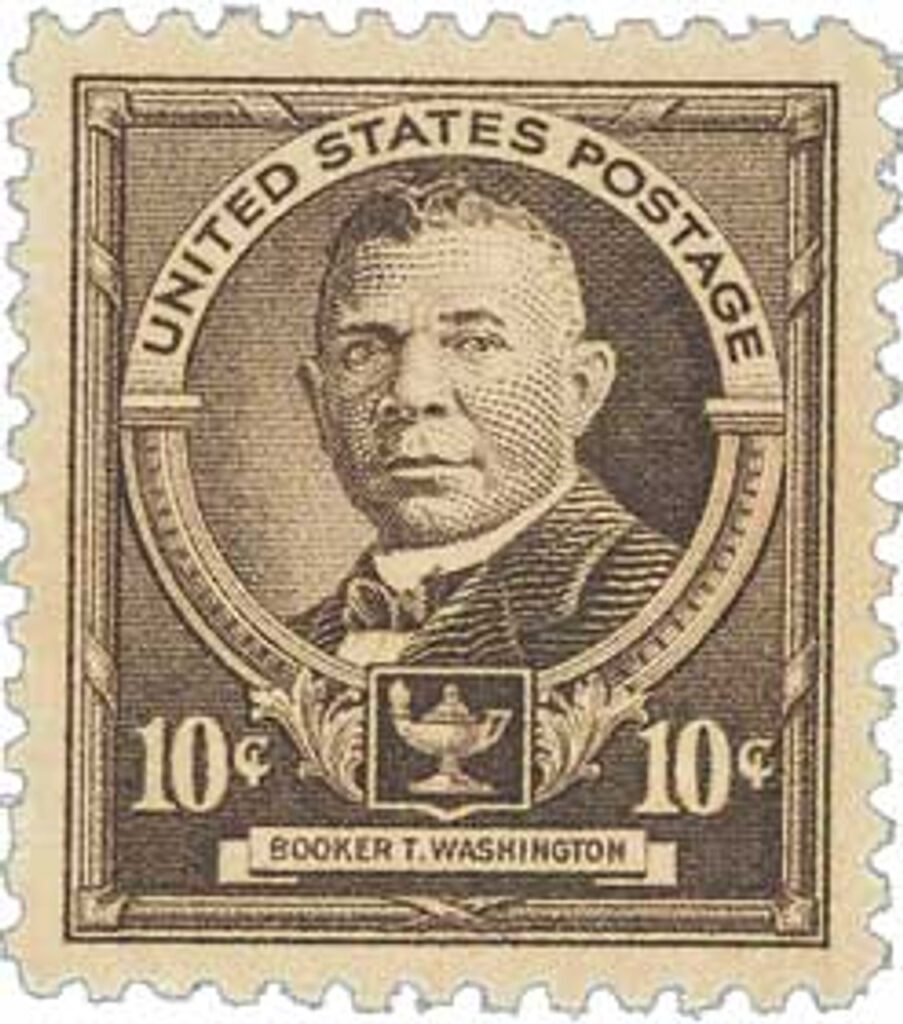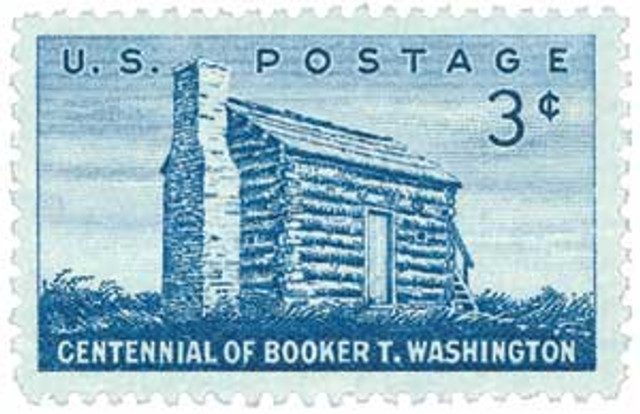Booker Taliaferro Washington was born into slavery on April 5, 1856, in Hale’s Ford, Virginia.
Booker grew up on the plantation with his mother, who worked there as a cook. His father was an unknown white man, likely from a nearby plantation. Booker began working as a child, carrying 100-pound bags of grain to the plantation’s mill. Passing by a nearby school one day, he looked in the window and saw children his age reading, and he longed to do the same.
When the Civil War was over, Booker’s family moved to Malden, West Virginia, where his mother married freedman Washington Ferguson. Booker did his part to help the struggling family by working with his stepfather in the salt furnaces. His mother recognized his desire to learn, so she bought him a book. He woke up every morning to study and soon learned to read and write. It was also around this time he took his stepfather’s first name as his last name.
When he was 10, Washington began working for Viola Ruffner, the wife of a coal miner. Though she was known for being tough on her workers, she recognized Washington’s maturity and intelligence and allowed him to attend school for an hour a day during the winter months while he worked for her. Then in 1872, he began walking a 500-mile journey to Hampton Normal and Agricultural Institute in Virginia, taking odd jobs along the way. Once he reached the school, Washington offered to work as a janitor to pay his tuition. Founder and headmaster Samuel Armstrong was impressed by Washington’s work ethic and offered him a scholarship.
After graduating in 1875, Washington went on to attend the Wayland Seminary in Washington, D.C., and teach at his former schools in Malden and Hampton. Then in 1881, the Alabama state legislature granted $2,000 for a “colored” school, known at the time as the Tuskegee Normal Industrial Institute. Washington’s former mentor, General Armstrong, was asked to recommend a white man to run the school. Instead, he suggested Washington, who then traveled the area promoting the school and raising money.
Washington dedicated himself to the school and its mission, teaching his own practices of patience, enterprise, and thrift. He became a national figure through his role at the school.

On September 18, 1895, Washington spoke at the Atlanta Cotton States and International Exposition and gave what is considered one of the most significant speeches in American history. Given to a mostly white audience, Washington was met with a cool reception at the start. He spoke about giving blacks – especially in the South – a basic education, due process in law, and a chance to work.
Washington also encouraged African Americans to learn a trade so they could prosper through hard work. He seemed to endorse segregation when he said, “We can be as separate as the fingers, yet one as the hand in all things essential to mutual progress.” The speech was met with loud applause and a standing ovation. The editor of a local newspaper called it “the beginning of a moral revolution in America.” Some black activists, such as W.E.B. DuBois, felt Booker had encouraged white oppression and named the talk the “Atlanta Compromise.”
Washington went on to advise two U.S. Presidents: Theodore Roosevelt and William Howard Taft. During President Theodore Roosevelt’s administration, Washington was influential in the appointment of several blacks to federal offices. In his best-selling autobiography, Up from Slavery, Washington discussed his journey from slavery to national prominence as an educator. He remained the head of the Tuskegee Normal and Agricultural Institute until his death on November 14, 1915.
Discover what else happened on This Day in History.



If Mr. Washington died in 1915, how could he influence Franklin Roosevelt’s presidency which began in 1932?
not Franklin…Theodore Roosevelt.
Hi Valorie – this has been fixed. Thank you.
When Washington’s second autobiography, Up From Slavery, was published in 1901, it became a bestseller and had a major effect on the African-American community, its friends and allies. In October 1901 President Theodore Roosevelt invited Washington to dine with him and his family at the White House; he was the first African American to be invited there by a president. Democratic Party politicians from the South, including future Governor of Mississippi James K. Vardaman and Senator Benjamin Tillman of South Carolina indulged in racist personal attacks when they learned of the invitation. Vardaman described the White House as
Very refreshing reminder but sad more black communities don’t teach his views.
I believe he meant Teddy
Hi Bill – this has been corrected. Thank you.
Think you may have missed the time line on this one. FDR took office in 1933.
Thanks for the correction!
Please Change title to April 5.
Hi Stephen – It has been corrected. Thanks!
You got the month wrong. It only FEELS like March 5 today!
Thanks, Steve. And very true.
I had the good fortune as a guest professor to visit Tuskegee University several years ago. I am very thankful that we have Tuskegee University. It is a “great” place with many achievements. I could see, feel, and experience the influence of Booker T. Washington. God Bless Tuskegee and all that are associated with that wonderful university. Respectfully submitted Dr. Doug Piirto, Professor Emeritus and RPF
Interesting how such an influential man could cause a moral conflict within the Civil Rights movement. His contributions continue today thru his writings and speeches; may we never forget.
I enjoyed reading and learning about Booker Taliaferro Washington. He was obviously a very smart man; he knew how to act and what to do during his years in the U.S. in order to live a better life … and he did. He proved himself and made positive contributions to our Nation. I am happy I got to find out who Booker T. Washington was. Thanks, Mystic !!